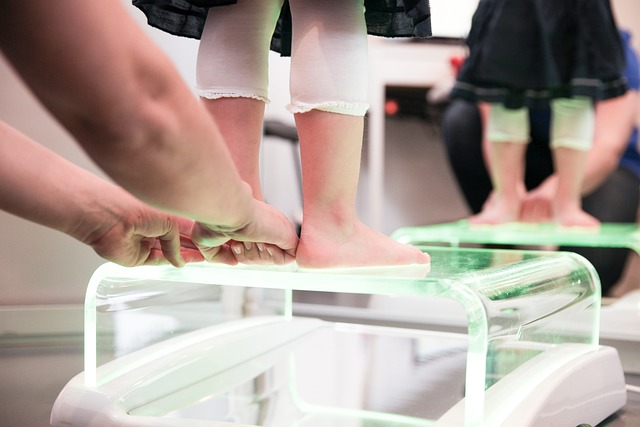Cold plunging, an ancient practice involving brief immersions in chilly water (50°F–60°F), has gained modern popularity as a powerful tool for managing stress and anxiety. Rooted in traditional cultures, this therapy is backed by science demonstrating its positive effects on mental well-being. Cold exposure triggers the release of "feel-good" hormones, reducing stress and anxiety, while improving mental clarity and cognitive function. Regular cold plunges offer an accessible, natural way to reduce stress and promote overall mental well-being, making them a game-changer for those seeking tranquility. Integrating cold water therapy into mental health care settings presents a promising complementary approach, potentially revolutionizing care by providing a natural method for managing stress and anxiety.
Discover the ancient secret to modern mental wellness: cold plunges. This practice, involving brief exposures to cold water, has gained prominence in mental health care for its remarkable ability to reduce stress and anxiety. From understanding the historical roots to exploring the science behind it, this guide delves into the therapeutic benefits of cold water therapy and offers practical insights on integrating it into mental healthcare settings for enhanced patient relaxation and recovery.
Understanding Cold Plunges: A Deep Dive into the Concept and Its History
A cold plunge is an immersive experience that involves submerging oneself in cold water, typically at temperatures ranging from 50°F to 60°F (10°C to 15°C). This ancient practice has gained modern popularity for its profound effects on both physical and mental well-being. The concept of cold plunges dates back centuries, with roots in traditional cultures worldwide, including Scandinavia, Japan, and Russia. These cultures utilized cold water as a medicinal tool, recognizing its ability to stimulate the body’s natural healing responses.
Today, many people turn to cold plunges as an innovative stress reliever and anxiety management technique within the realm of mental health care. The practice involves briefly exposing oneself to icy water, which triggers a cascade of physiological reactions. This includes increased heart rate, followed by a subsequent drop once the body adjusts, promoting a sense of calm and relaxation. The benefits of cold plunges for stress relief and anxiety reduction have been backed by scientific research, highlighting their potential as an effective complementary therapy alongside traditional mental health treatments.
The Science Behind Cold Therapy: How It Impacts the Body and Mind
The science behind cold therapy reveals a fascinating interplay between the body and mind. Cold plunges, such as immersing oneself in icy water, trigger a cascade of physiological responses. Acutest cold exposure stimulates the release of norepinephrine and endorphins, often referred to as “feel-good” hormones, which can significantly reduce stress and anxiety levels. This sudden shock to the system also activates the body’s natural defense mechanisms, promoting a state of deep relaxation once the cold is removed.
Beyond physical responses, cold water therapy has been shown to improve mental clarity and enhance cognitive function. The calming effects of cold plunges can help individuals combat the constant mental noise and stress that modern life often brings. By integrating this ancient practice into modern mental health care, professionals are providing a unique and effective tool for managing stress and anxiety. The benefits of cold plunges for stress relief are well documented, making them a valuable addition to any holistic approach to mental wellness.
Benefits of Cold Plunges for Stress and Anxiety Reduction
Cold plunges, or cold water therapy, have gained recognition as an innovative approach to enhancing mental well-being and managing stress and anxiety. This ancient practice involves briefly exposing oneself to cold water, typically through immersing in ice-cold baths or taking frigid showers. The benefits are multifaceted; it triggers a physiological response that stimulates the release of endorphins, often referred to as ‘feel-good’ hormones, which can reduce stress hormones like cortisol and adrenaline. This natural chemical shift promotes a sense of calm and relaxation, offering an effective remedy for those dealing with anxiety.
Additionally, cold water immersion has been shown to improve blood circulation and increase oxygen delivery to the brain, leading to enhanced cognitive function and emotional resilience. The sudden cold shock can also act as a powerful stressor, prompting the body’s ‘fight or flight’ response and subsequently helping individuals develop mental fortitude. As a result, regular cold plunges can be a game-changer in managing everyday stress and promoting overall mental health, providing an accessible and natural way to find tranquility and balance.
Practical Integration: Implementing Cold Water Therapy in Mental Health Care Settings
Integrating cold water therapy, specifically cold plunges, into mental health care settings offers a promising approach to enhancing traditional treatment methods. This ancient practice, increasingly recognized for its therapeutic benefits, can provide a calming effect for individuals dealing with stress and anxiety. By incorporating short cold exposures, patients may experience reduced anxiety levels and improved overall well-being.
Practical implementation involves dedicated spaces equipped with cold water sources, ensuring patient safety and comfort. Therapists can guide individuals through controlled immersions, allowing them to harness the benefits of cold plunges while learning coping strategies. This innovative integration has the potential to revolutionize mental health care, offering a natural, accessible way to manage stress and promote relaxation.
Integrating cold plunges into mental health care offers a unique and promising approach to enhancing well-being. With its ability to induce significant stress and anxiety reduction, cold water therapy can be a powerful tool in the arsenal of healthcare professionals. The scientific understanding of cold therapy’s physiological effects supports its potential for calming the mind and body. By implementing practical strategies discussed in this article, mental health care settings can introduce cold plunges as an accessible and effective method for promoting relaxation and overall resilience among patients. Embracing this ancient practice with modern guidance can lead to transformative experiences, contributing to improved mental health outcomes.
